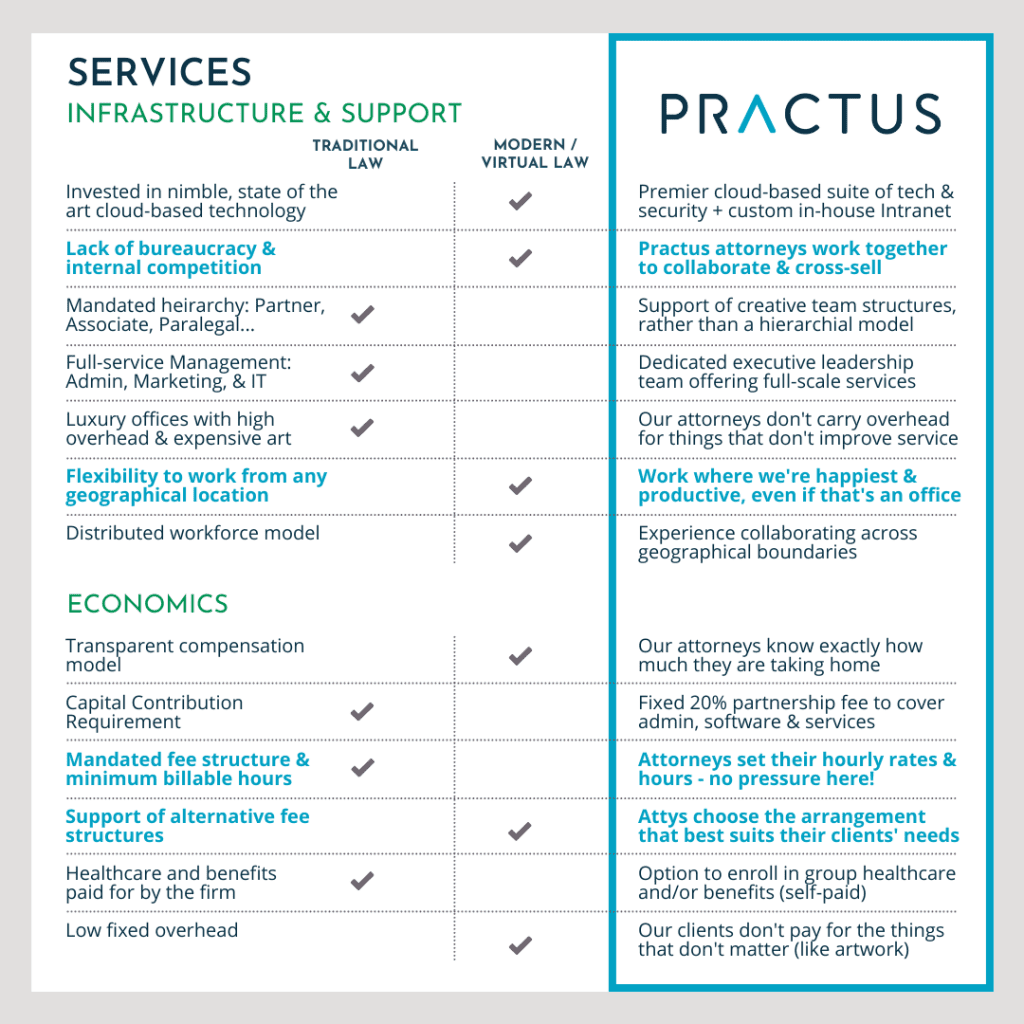Breaking Down the Meanings of Virtual, Distributed & Hybrid Law Firms
When you’re in the legal industry, word choice and verbiage are the heart of your profession. One omission of “shall” and your contract has an entirely different meaning. So… why is it that the vernacular around describing modern (virtual, distributed, and hybrid) law firm models is so difficult to pin down?
What is a modern law firm?
Modern law firms have emerged at an exceedingly fast rate over the last couple of years, giving the historically low-tech field of law a much needed leap into the digital age, and how big of a leap into this modern era differs with each law firm. The three main buzzwords used to describe this new age of technology-forward firms are: virtual, distributed, and hybrid.
Most firms don’t fit into just one category; they take different benefits (or unintentionally some detriments) of each to create their own modern law firm structure. While it’s not as important to fit each firm into one specific box, it is important to understand what firms are describing when they use different modern firm terminology. This article takes a deep dive into the benefits of the three types of modern law firms, how they’re different from traditional firms, and which aspects Practus takes from each category.
What is a virtual law firm?
A fully virtual law firm has no offices – your entire practice can be accessed with a laptop and you can work with clients from anywhere in the world. No offices also means no localized technology, libraries, or commutes. A key to virtual law firms is successful, strategic use of technology. Technology that supports attorneys and the administrative work behind being a lawyer allows for a virtual-type firm to operate in parallel capacity to a traditional firm.
Virtual firms should be entirely cloud-based so that you can access your files, communicate with clients, and research from anywhere. For example, Practus leverages smart systems such as ProLaw – our firm management software, a 100% cloud-based business management tool that helps with billing, financial management, reporting, risk management, and client information. That means that wherever you go, so does your practice.
What is a distributed law firm?
The key to distributed law firms is that they are location independent and attorneys can work in whatever way fits their lifestyle best – at a home office, virtually, or in a physical location. Attorneys are distributed around the world to give clients a full-service law firm wherever they are while giving lawyers the freedom to work from anywhere.
This location independence of a distributed law firm takes away the competition that can occur within practice areas spread between locations in a traditional firm. Office locations aren’t pitted against each other to prove better performance or risk being shut down. Much like a virtual firm, location independence liberates attorneys to collaborate together with anyone in the firm, instead of whichever attorneys are in their current office, better supporting clients that are geographically-diverse or distributed themselves.
Reducing intra-firm competition is also a result of a change in firm structure. It’s common for distributed firms to bring on attorneys at the partner level, so there isn’t that competition to climb the ladder or the uncertainty behind when you’ll actually make partner. This is reflected in the favorable compensation structures at distributed firms, which are usually based on an attorney’s book of business and intra-firm referrals (these compensation structures are often used in virtual firms as well). An added bonus: clients based in big cities like New York and San Francisco are no longer forced to pay the higher hourly rates common among big city attorneys . Geography is removed from the economic equation and clients pay for the quality of services rendered, with no added costs.

What is a hybrid law firm?
A hybrid law firm falls between a fully-virtual firm and a traditional firm. Like a virtual firm, a hybrid firm leverages technology to work across jurisdictions and in locations around the world. Like a traditional firm, hybrid firms have physical offices where you can work.
It’s common for attorneys to spend 60/40 of their time between in-person and remote office spaces at hybrid law firms. This option can be great for clients that prefer in person interactions over virtual meetings. Keep in mind that 83% of attorneys now meet with their clients virtually. More and more, clients prefer options of convenience (including meetings, billing, and communication) rather than in-person visits.
Hybrid law firms are also beneficial to attorneys that prefer a dedicated space to work outside of the home. While many virtual and distributed attorneys have dedicated work spaces or opportunities for office space when needed, hybrid attorneys tend to prefer going into the office half of the time or more compared to occasionally.
A big difference between hybrid and virtual firms is this dedicated office space typically is paid for by charging partnership fees around 10% higher than at virtual firms. If you choose a truly hybrid firm, you’re committing to spending at least 10% of your earnings towards having this space which you may rarely use.

Client benefits of modern law firms
So far, we’ve touched mostly on how attorneys benefit from modern law firms, but client benefits are just as (if not more) important. Because the truth is that what’s best for the law firm as a whole comes down to what’s best for the client.
Unsurprising to us, recent years have shown that not only do modern law firms meet clients’ needs, they actually improve the attorney-client relationship overall. A big reason for this is improved communication with lower overhead costs. In fact, 68% of firms say technology helps the client experience. But how does it help and why are these modern firms resonating so well with clients??
Here are just some of the benefits clients get when working with attorneys at modern firms:
- Improved security around client information due to the ability to immediately lock down during potential data risks;
- Clients save on legal services while attorneys have more take home pay thanks to no overhead cost for facilities, offices, and marble foyers;
- Clients can propose revisions and ask questions completely online, creating an easier way to reach your goals together;
- Attorneys are able to work more efficiently with cloud software, saving clients time and money;
- Clients aren’t limited to attorneys by geographical location – they get access to attorneys across the world that can best serve their legal needs;
- Adapting to changing client needs becomes faster and more efficient thanks to a nimble environment;
- Costs remain low to clients as the firm grows due to the ability to scale quicker and at lower overhead cost;
- Attorneys and clients create a fee structure that works best for them since most modern law firms offer alternative fee arrangements.
Modern firms compared to traditional firms
Traditional law firms have physical offices that are the main place for attorneys to practice law. There is a hierarchy of interns, legal staff, paralegals, associates, partners, and named partners that form the firm as a whole. Typically, lawyers work their way up through the firm ladder with the ultimate goal of becoming a named partner.
Many traditional law firms embrace technology to support their attorneys and clients in a newly-remote world, but it isn’t the backbone of the firm’s infrastructure. Their infrastructure is… well… structure-based (both literally and in a personnel sense). The hierarchy is established, the place of business is physical, and the compensation structure is typically salary + bonuses + profit sharing if you make it to the partner level, very similar to other professions.
This way of practicing law has been around for centuries, and it’s a great fit for many attorneys. Traditional firms offer stable salaries, an established network, office space, and often have layers of legal staff to assist. You’re likely to reach a ceiling on what you’re able to accomplish at a traditional firm because of bureaucracy and compensation packages, but you have a structured environment and routine provided for you.
Since 2020, the reality is nearly every attorney has practiced law remotely, but a temporarily-remote position is different from a modern law firm. Technology is the backbone of modern firms, compared to some traditional law firms where it acts as more of a band aid – holding the firm together until in-office practice can fully resume.
Modern law firms are ideal for attorneys that want the most control over where and when they practice law, get excited about technology working for them, and enjoy virtually collaborating as a team without the need of an office. Not to mention the financial savings to both partner and client.
Better compensation, freedom to practice law the way you want to, and technology working for you… this all sounds great so why doesn’t everyone do it??
The truth is working at a modern law firm isn’t for everyone. Most of these firms require a minimum book of business to join since you’re typically brought on at the partner level, and you’ll definitely need an entrepreneurial mindset to be successful in this environment. Strong time management, a drive to grow your book of business, and the ability to work with technology are all musts.
Modern law firms tend to be good fits for attorneys that want to be in control over their practice, take home more of what they earn than they would at a traditional law firm, and focus most of their time and energy on practicing law instead of all the administrative work that comes with running their own firm.
What type of law firm is Practus?
Practus is a true modern law firm – we are virtual by design thanks to our best-of-breed technology for attorneys and backend administrative support, our attorneys and non-legal staff are distributed around the world, and in some attorneys opt for physical offices in their location. We take a little bit of the best each modern firm model to create a culture and client experience that exceeds expectations.
Most of our attorneys come from a traditional law firm background, but recognized that the bureaucracy and overhead wasn’t for them… or their clients. Practus is efficient and streamlined, allowing you to advise your clients from anywhere in the world and maintain control over your practice.
The graphic below highlights what we offer while comparing it to other types of law firms:

Since we were designed to be virtual from the onset, technology is and always will be the infrastructure that keeps Practus running smoothly, but having a connected culture has always been engrained in our firm’s DNA. It’s been a priority since day one to create a community of attorneys that collaborate, feel connected, and engage with one another. Our attorneys use technology to work for them while building a community that makes Practus the firm it is today.
You can learn more at join.practus.com. Please reach out to me at Stephanie.Recupero@practus.com if you think Practus is the right fit for you.






